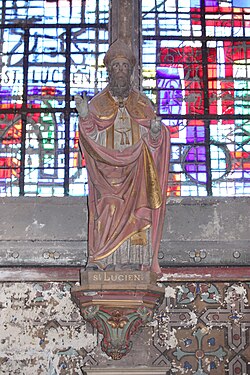Lucian of Beauvais
| Saint Lucian of Beauvais | |
|---|---|

Statue of St. Lucian, Cathedral of Beauvais.
|
|
| Apostle of Beauvais | |
| Died | c. 290 AD Beauvais |
| Venerated in | Roman Catholic Church Orthodox Church |
| Major shrine | Formerly the cathedral of Beauvais |
| Feast | January 8 |
| Patronage | Beauvais |
Saint Lucian (Lucianus, Lucien) of Beauvais (died c. 290 AD) is a Christian martyr of the Catholic Church, called the "Apostle of Beauvais." He was killed in the 3rd century during the Diocletian persecution, although later traditions make him a martyr of the 1st century instead. This was because the church of Beauvais attempted to claim apostolic origins for itself. Odo, bishop of Beauvais during the 9th century, was actually the first writer to designate Lucian as the first bishop of Beauvais.
Nevertheless, the foundation of the diocese of Beauvais is traditionally attributed to him. His Passio assigns him two disciples, Maximian (Maxien, Maximien) and Julian (Julien), who were decapitated with him on the hill of Montmille.
The details of his life are largely unknown; the date of his death was moved backwards in time in order to lend his see more antiquity, a common practice during the Middle Ages. As Hippolyte Delehaye writes, "To have lived amongst the Saviour's immediate following was...honorable...and accordingly old patrons of churches were identified with certain persons in the gospels or who were supposed to have had some part of Christ's life on earth."
Tradition holds he came from a noble family of Rome. He was named "Lucius" like his father, but when he was converted to Christianity by Saint Peter himself, he took the name of Lucian. As a young man, he preached in Italy and then he was ordained bishop by Pope Clement I (who actually lived in a different century), who sent him to Gaul with Saint Denis and Rieul of Reims, among others (Lucian is also called an associate of Saint Quentin), to preach there. He was imprisoned in Parma, but was freed by Christians there. He converted people in Pavia before arriving in Arles, where he once again met up with Saint Rieul. Denis and Lucian continued towards Lutetia. Marcellinus and those accompanying him continued on to Spain. Denis remained in Lutetia while Lucian continued onto Beauvais, at the time known as Caesaromagus.
...
Wikipedia
